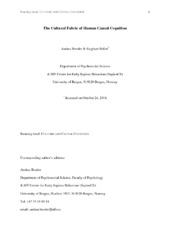| dc.contributor.author | Bender, Andrea | |
| dc.contributor.author | Beller, Sieghard | |
| dc.date.accessioned | 2020-08-04T11:35:43Z | |
| dc.date.available | 2020-08-04T11:35:43Z | |
| dc.date.issued | 2019 | |
| dc.Published | Bender A, Beller S. The cultural fabric of human causal cognition. Perspectives on Psychological Science. 2019;14(6):922-940 | eng |
| dc.identifier.issn | 1745-6916 | |
| dc.identifier.issn | 1745-6924 | |
| dc.identifier.uri | https://hdl.handle.net/1956/23402 | |
| dc.description.abstract | Causal cognition emerges early in development and confers an important advantage for survival. But does this mean that it is universal in humans? Our cross-disciplinary review suggests a broad evolutionary basis for core components of causal cognition but also underlines the essential role of culturally transmitted content as being uniquely human. The multiple ways in which both content and the key mechanisms of cultural transmission generate cultural diversity suggest that causal cognition in humans is not only colored by their specific cultural background but also shaped more fundamentally by the very fact that humans are a cultural species. | en_US |
| dc.language.iso | eng | eng |
| dc.publisher | SAGE | eng |
| dc.title | The cultural fabric of human causal cognition | eng |
| dc.type | Peer reviewed | |
| dc.type | Journal article | |
| dc.date.updated | 2019-11-13T14:07:55Z | |
| dc.description.version | acceptedVersion | |
| dc.rights.holder | Copyright 2019 The Author(s) | eng |
| dc.identifier.doi | https://doi.org/10.1177/1745691619863055 | |
| dc.identifier.cristin | 1724159 | |
| dc.source.journal | Perspectives on Psychological Science | |
| dc.relation.project | Norges forskningsråd: 262618 | |
